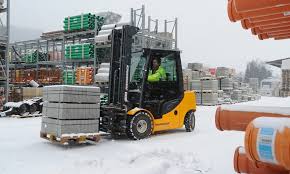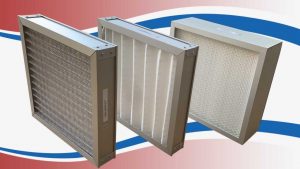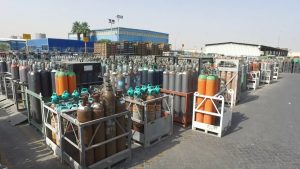4 ways to improve forklift truck safety in your warehouse this winter
Forklifts are essential in most warehouses, but they can also be incredibly dangerous — especially when the weather turns cold. In this article, Kelly Friel from industry suppliers Zoro shares his tips for getting your forklifts winter-ready.
Forklift accidents in your warehouse can be devastating for a number of reasons, and unfortunately, they are all too common. In fact, around 1,300 UK employees are hospitalised each year following forklift accidents (British Safety Council), and the injuries sustained during these incidents can be among the most serious.
When winter comes around, that number could increase due to reduced daylight hours, cold temperatures, and wet or icy conditions, so it’s imperative to take extra safety precautions. Below, I’ll take you through five key ways to winter-proof your forklift operations.
Prepare your warehouse
Optimising the environment that your forklifts operate in is an important step to preventing accidents, especially during less than ideal weather. You should always keep your warehouse floor clear if you’re operating heavy machinery, so you likely already have a cleaning and maintenance system in place. But this time of year is a great opportunity to review how your floor is organised. For example, could forklift journeys be shortened by changing the layout?
Shorter days mean less sunlight during working hours, so I would recommend checking and testing the lighting and heating systems you have in place. Pay particular attention to those that aren’t used year-round, as this can reduce the risk of them not working properly when you need them the most. It’s also advisable to have a supply of grit handy and keep an eye on the forecast, then spot-treat areas of your warehouse that could become a slip hazard, such as the loading bay. That should help head off any potential crashes that can damage your forklifts or injure workers.
Provide PPE to your staff
Forklift operators and people working in the vicinity of forklifts should always have high-visibility outerwear, such as vests or jackets, to make sure they can be clearly seen by everyone on the warehouse floor. Many warehouses also choose to offer head torches to increase the visibility of their staff, particularly when working after sunset. In winter, you should consider providing further PPE that can protect warehouse operators from the weather and help keep them alert, reducing the risk of illness or injury. Consider wind-proof clothing, as well as company fleeces, gloves and hats, and advise your workers to dress appropriately in warm layers of clothing.
Organise regular training
The best way to ensure forklift safety at any time of year is to sufficiently train your operations staff in compliance with industry standards and to organise plenty of additional refresher sessions. This should lead to more competent drivers, as well was warehouse floor staff that behave more sensibly around forklifts. Around winter, I would suggest holding a mandatory staff training session reminding your workforce to be vigilant of rainwater, ice and other hazards that can crop up at this time of year.
If your warehouse requires temporary seasonal staff in the run-up to Christmas, they will also need to be fully educated on forklift safety before they are allowed onto the warehouse floor, no matter how short their contracts may be.
Maintain your machines
Winter can play havoc with your machines, and a neglected forklift can lead to even more workplace incidents — for example, due to break failures. Always store your forklifts in dry areas and use covers to protect them from elemental damage. Clean your machines regularly: you may wish to encourage your operators to wash them, check their fluid levels, and plug in the battery or battery heater after every use.
In the run-up to winter, you could look into winter tyres or fitting chains or studs to help them grip better in snow, and you should use fuels, hydraulic fluids and other liquids that can withstand freezing temperatures. The operator’s manual should indicate what best to use for the model you have.
The tips in this guide can help you keep your warehouse free from forklift incidents this winter. Focus on training, maintenance, PPE and preparing your warehouse to address all the most common issues that wintery conditions can bring.






